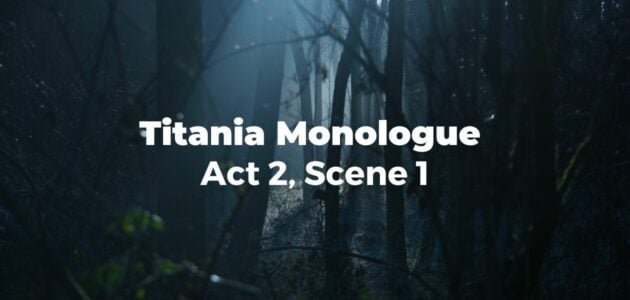
Titania Monologue (Act 2, Scene 1)
Titania. What a character! She is one commanding lady, and no wonder Oberon has to turn to magic to get what he wants – there is no messing with Titania! I hope this page will be helpful in unpacking this incredible monologue. Remember, this is not an academic analysis, but a practical guide to help you bring this Titania monologue to life. Enjoy!
Initial Thoughts
#1 Titania is a queen. One of the great challenges of Shakespeare is to step up to the grandeur of the text and characters. Titania is a perfect example of this, and approaching this as “realism” simply won’t work. Not only do you have to play with status as Titania, as she is a Queen, you also have to think about the otherworldly quality of the character. What is to have such power?
#2 Never go full fairy!!! A major challenge with Oberon, Puck and Titania is how far do you go with the fairy element. There are some productions that disregard this entirely and others majorly focus on this element. I am not just talking about costume, but also gesturing and vocal choices. Consider how you play this side of Titania. I certainly think this magical element needs to be acknowledged, but I would recommend still always aiming for truth in the performing of it.
#3 Language is tough. This is one of the toughest monologues in the play. The text is so dense and there are a lot of images to unpack. You need to really pick this one a part and make sure that you understand every word.
#4 Imagination. As you can see from this text, it involves some huge imagery. Everything from the “pelting rivers” to the “angry winter”. It’s like listening to a national geographic podcast! So not only do you need to understand every word you have to make sure the ideas are crystal clear to you. If you see them, we see them!
#5 Keep it personal. I have listed above just how much you have to fire up your imagination to make this monologue work. But remember that you don’t want to get too lost in the images. She isn’t reading Oberon a poem, instead she is using these images and her words to cut him down and win the argument. So keep it personal. I see too many actors getting lost in the imagery, and not focusing enough on the argument with Oberon.
READ MORE: How to Act Shakespeare
What has just happened?
Act 2 Scene 1 is the first time we are introduced to the world of the fairies within the play. Puck has just introduced what is happening, and he has set the scene for the feud between the Titania and “her jealous Oberon – the king of the fairies. These two have fallen out over a changeling boy that Oberon “wants for his henchman”, but Titania will not surrender him. Like with most fights, however, we get the sense that there is more to it than meets the eye. Oberon before this speech accuses Titania of cheating on him with Theseus, and here is her powerful response. Similar to Hermione in The Winter’s Tale she is standing up proudly again a jealous partner, and boy does she put Oberon in his place!
These are the forgeries of jealousy (Full Text)
These are the forgeries of jealousy:
And never, since the middle summer’s spring,
Met we on hill, in dale, forest or mead,
By paved fountain or by rushy brook,
Or in the beached margent of the sea,
To dance our ringlets to the whistling wind,
But with thy brawls thou hast disturb’d our sport.
Therefore the winds, piping to us in vain,
As in revenge, have suck’d up from the sea
Contagious fogs; which falling in the land
Have every pelting river made so proud
That they have overborne their continents.
The ox hath therefore stretch’d his yoke in vain,
The ploughman lost his sweat, and the green corn
Hath rotted ere his youth attain’d a beard;
The fold stands empty in the drowned field,
And crows are fatted with the murrion flock;
The nine-men’s-morris is fill’d up with mud,
And the quaint mazes in the wanton green
For lack of tread are undistinguishable.
The human mortals want their winter cheer:
No night is now with hymn or carol blest.
Therefore the moon, the governess of floods,
Pale in her anger, washes all the air,
That rheumatic diseases do abound:
And thorough this distemperature we see
The seasons alter: hoary-headed frosts
Fall in the fresh lap of the crimson rose;
And on old Hiems’ thin and icy crown,
An odorous chaplet of sweet summer buds
Is, as in mockery, set; the spring, the summer,
The childing autumn, angry winter, change
Their wonted liveries; and the mazed world,
By their increase, now knows not which is which.
And this same progeny of evils comes
From our debate, from our dissension;
We are their parents and original.
Unfamiliar Words
Forgeries: lies
Dale: valley
Paved fountain: pebbly spring
Rushy brook: weedy stream
Margent: border
Ringlets: in circles
Ploughman: farmer
Nine-men’s-morris: a game (learn more)
Conclusion
This is an incredibly fun monologue to tackle, so remember to enjoy it! Though the main themes are jealousy and disaster, remember that you can still be playful. Prepare the piece as thoroughly as you can and never give up on the words. Keep digging, and keep trying to find more in this incredible monologue. For more A Midsummer Night’s Dream monologues.

Leave a Reply